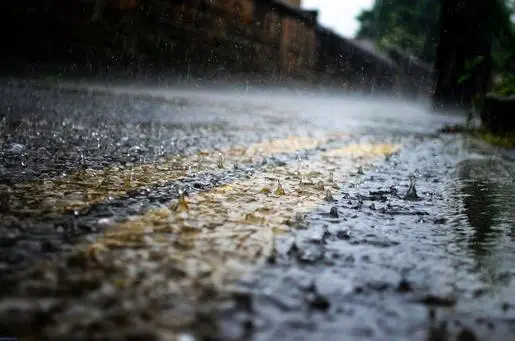Can a refrigerator get rained on? You may not notice much harm if your refrigerator is a bit wet. However, the manufacturer’s manual is your finest source of information. Make sure you follow the manufacturer’s directions if your refrigerator has been exposed to water or moisture in any way.
You should quickly wipe down your refrigerator after bringing it indoors to eliminate any moisture or wetness, even if it hasn’t rained. To avoid rusting, take sufficient time to make sure there is no moisture left.
It is possible to have too much rain. Keep in mind that while some machines are water-resistant, others can shock you if they come into contact with water.
Can A Refrigerator Get Rained On?
Can a refrigerator get rained on? It’s a valid question and one that we will attempt to answer in this article. It’s also a question that doesn’t have a straightforward answer, as there are a few factors to consider. For example, does the type of refrigerator matter? And what about the amount of rain? Let’s take a closer look at each of these factors to see if we can come to a more definitive answer.
The type of refrigerator matters when it comes to rain. If you have an older model fridge, it’s probably not weather-sealed as well as newer models. This means that if you live in an area with a lot of rainfall, maybe that rain could get into your fridge and cause problems. On the other hand, newer models are much more weather-sealed and likely wouldn’t be affected by a little rain.
Another factor to consider is the amount of rainfall. If you live in an area with light rainfall, it’s probably not going to be an issue if your fridge gets wet. However, if you live in an area with heavy rainfall, you might want to take steps to protect your fridge from the elements. One way to do this is to make sure that it’s under a covered area, such as a carport or garage.
So, can a refrigerator get rained on? It depends. If you have an older model fridge, maybe that rain could get inside and cause problems. However, newer models are much more weather-sealed and likely wouldn’t be affected by a little rain. The amount of rainfall is also a factor to consider, as light rainfall probably won’t be an issue, but heavy rainfall could be a problem if your fridge isn’t protected from the elements.
Interesting Read: Refrigerator Blows Hot Air?
Are All Refrigerators Weather-Proof?
To survive the long, hot summers, it’s important to have a reliable refrigerator. But not all refrigerators are created equal. Some models are more resistant to the elements than others. So, what should you look for when shopping for a weather-proof refrigerator?
First and foremost, you’ll want to make sure that the model you select is designed for outdoor use. Some refrigerators are made specifically for this purpose and are built to withstand extreme temperatures. If you’re not sure whether or not a particular model is weather-resistant, check the manufacturer’s website or speak to a customer service representative.
Next, take a close look at the construction of the refrigerator. Outdoor refrigerators need to be constructed from sturdy materials that can stand up to the elements. For example, stainless steel is a good choice because it won’t rust or corrode over time. You’ll also want to make sure that the seal around the door is tight so that moisture and insects can’t get inside.
Finally, pay attention to the features offered by different models. Some refrigerators come with special features that make them even more resistant to the elements. For example, some models have an automatic defrost function that prevents ice from building up and causing problems. Other models come with a UV-resistant coating that helps to keep the unit cooler in direct sunlight.
When shopping for a weather-proof refrigerator, make sure to choose a model that is designed for outdoor use. Pay attention to the construction of the unit, and look for features that make it more resistant to the elements. With a little bit of research, you can find the perfect refrigerator for your needs.
Interesting Read: Why Is My Fridge Sounds Like Running Water?
Is It Safe to Leave a Refrigerator Outside?
Is It Safe to Leave a Refrigerator Outside? Leaving a refrigerator outside is not recommended as it can be a safety hazard. If the power goes out, the food will spoil and you will have to throw it away. Also, if it rains or snows, the water can damage the appliance.
If you live in an area with severe weather conditions, it is best to keep the fridge inside to avoid any potential damage. Another reason why it is not advisable to leave a fridge outside is that it can attract animals. If there are any openings or cracks, animals can crawl inside and become trapped.
This can lead to them becoming injured or even dying. In addition, leaving a fridge outside can also be a fire hazard. If the power cord is left exposed, it could come into contact with water and cause an electrical fire. For these reasons, it is best to keep your fridge inside your home where it will be safe from harm.
If Water Gets Inside Your Refrigerator, Here’s What to Do
If you notice that water has somehow gotten inside your refrigerator, don’t panic. While this can certainly be a cause for concern, there are a few simple steps you can take to resolve the issue.
First, check to see if the water is coming from a spilled beverage or food item. If so, simply wipe it up with a paper towel or cloth.
If the water appears to be coming from the fridge itself, the drip pan may be full. The drip pan is located beneath the refrigerator and collects water that drips from the condenser coils. If this is the case, empty the drip pan and dry it thoroughly.
If the water continues to accumulate, contact a qualified repair person to inspect your refrigerator for leaks. in most cases, a simple fix like tightening a loose hose connection will do the trick. However, if the issue is more serious, such as a cracked water line, you may need to replace the affected part.
No matter what the cause of the leak, it’s important to act quickly to prevent further damage to your fridge. With a little care and attention, you can keep your refrigerator running smoothly for years to come.
Interesting Read: Refrigerator Short Cycling?
Final Thought
While it is not advisable to leave a refrigerator outside in severe weather conditions, there is a chance that it could get rained on. If this happens, make sure to unplug the fridge and dry it off as quickly as possible. If the water damage is extensive, you may need to contact a qualified repair person to inspect your appliance. With a little care and attention, you can keep your refrigerator running smoothly for years to come.


